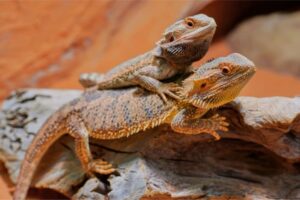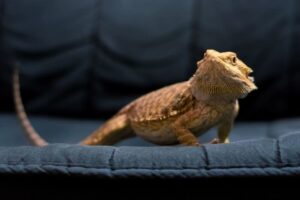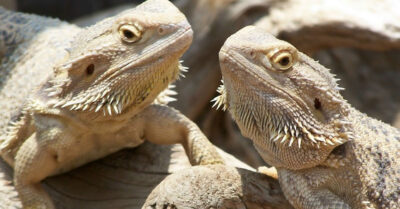Can bearded dragons eat peaches? It’s a question that often arises among reptile enthusiasts and pet owners. These fascinating creatures have unique dietary needs, and understanding what they can safely consume is crucial for their well-being.
Yes, bearded dragons can eat peaches in moderation. Peaches can be a tasty and nutritious addition to their diet when offered occasionally. However, it’s important to prepare them properly and feed them in moderation to avoid any potential digestive issues.
Remove the pit and skin before offering slices of peach to your bearded dragon, as these parts can be difficult for them to digest. Additionally, ensure that peaches are only a small part of their overall diet, which should primarily consist of vegetables, insects, and other suitable foods.
Can bearded dragons eat peaches?

Bearded dragons can eat peaches in moderation, but they should be given sparingly and as an occasional treat. Peaches are rich in vitamins and minerals such as vitamin C, vitamin A, and potassium, which can be beneficial for your beardie’s health when consumed in small amounts.
When offering peaches to your bearded dragon, make sure to remove the pit and any seeds, as they can be a choking hazard and may contain cyanide. Additionally, it’s essential to provide a varied diet that includes a mix of vegetables, fruits, and insects to ensure your bearded dragon receives all the nutrients it needs to thrive.
Always introduce new foods gradually and monitor your bearded dragon for any adverse reactions. If you notice any digestive issues or changes in behavior after feeding peaches or any other new food, it’s best to consult with a reptile veterinarian for guidance.
Potential benefits and risks of feeding peaches to bearded dragons
Feeding peaches to bearded dragons can offer some potential benefits as well as risks:
Potential Benefits:
- Nutritional Content: Peaches contain essential vitamins and minerals such as vitamin C, vitamin A, potassium, and dietary fiber, which can contribute to the overall health of your bearded dragon.
- Hydration: Peaches have a high water content, which can help keep your bearded dragon hydrated, especially if they are reluctant to drink water from their bowl.
- Variety in Diet: Offering a variety of fruits, vegetables, and insects helps provide a balanced diet for your bearded dragon and can prevent nutritional deficiencies.
Potential Risks:
- High Sugar Content: Peaches contain natural sugars, which can contribute to obesity and other health issues if fed excessively. Regular consumption of sugary fruits can also lead to dental problems in bearded dragons.
- Digestive Upset: Some bearded dragons may have sensitive digestive systems and may experience diarrhea or gastrointestinal upset if they consume too much fruit, including peaches.
- Choking Hazard: The pit and seeds of peaches can be a choking hazard for bearded dragons. Always remove these parts before offering peaches to your pet.
- Pesticide Residues: If you’re feeding store-bought peaches, there’s a risk of pesticide residues. It’s best to wash fruits thoroughly before offering them to your bearded dragon or consider buying organic peaches.
To minimize risks and maximize benefits, feed peaches to your bearded dragon in moderation, as an occasional treat, and always in combination with a well-balanced diet of leafy greens, vegetables, and protein sources like insects. Monitor your pet for any adverse reactions and adjust their diet accordingly. If you have concerns or notice any health issues, consult with a reptile veterinarian for guidance.
How to Feed Peaches to Your Bearded Dragon
Feeding peaches to your bearded dragon can be a simple process if done correctly. Here’s a step-by-step guide on how to feed peaches to your pet:
- Choose Ripe Peaches: Select ripe, fresh peaches from a reliable source. Organic peaches are preferable to minimize the risk of pesticide residues.
- Wash Thoroughly: Before offering peaches to your bearded dragon, wash them thoroughly under running water to remove any dirt, debris, or pesticide residues that may be present on the skin.
- Remove Pit and Seeds: Peaches contain a large pit or stone in the center, along with seeds. These can be a choking hazard for your bearded dragon and should be removed before feeding. Cut the peach into small, bite-sized pieces, ensuring that no pits or seeds remain.
- Offer in Moderation: Feed peaches to your bearded dragon in moderation as an occasional treat, rather than a staple food. Too much fruit, including peaches, can lead to health issues such as obesity and digestive upset due to their high sugar content.
- Introduce Gradually: If it’s the first time you’re offering peaches to your bearded dragon, introduce them gradually. Start with a small amount and observe how your pet reacts. Some bearded dragons may have sensitive stomachs and may need time to adjust to new foods.
- Monitor for Adverse Reactions: After feeding peaches to your bearded dragon, monitor them closely for any adverse reactions or changes in behavior. Signs of digestive upset may include diarrhea, vomiting, or lethargy. If you notice any concerning symptoms, discontinue feeding peaches and consult with a reptile veterinarian.
- Offer Variety: While peaches can be a tasty treat for your bearded dragon, it’s essential to provide a varied diet that includes a mix of leafy greens, vegetables, insects, and occasional fruits. This ensures that your pet receives all the essential nutrients they need to stay healthy.
By following these steps, you can safely incorporate peaches into your bearded dragon’s diet as an occasional snack, providing them with a tasty and nutritious treat.
Signs of Overfeeding or Nutritional Imbalance

Signs of overfeeding or nutritional imbalance in bearded dragons can manifest in various ways. Here are some common signs to watch out for:
- Obesity: Overfeeding, especially high-calorie foods like fruits, can lead to obesity in bearded dragons. Signs of obesity include a visibly rounded or bulging abdomen and difficulty moving or being lethargic.
- Poor Appetite: While a sudden loss of appetite can indicate illness, consistently refusing to eat certain foods or a lack of interest in food altogether could be a sign of nutritional imbalance or overfeeding.
- Diarrhea or Runny Stools: Feeding too much fruit, including peaches, can lead to digestive upset and diarrhea in bearded dragons. Diarrhea is often characterized by loose or watery stools.
- Regurgitation or Vomiting: Overfeeding or feeding inappropriate foods can lead to regurgitation or vomiting in bearded dragons. This can occur if the digestive system is overloaded or if the food is difficult to digest.
- Metabolic Bone Disease (MBD): Nutritional imbalances, particularly inadequate calcium and vitamin D3 intake, can lead to metabolic bone disease in bearded dragons. Signs of MBD include soft, rubbery bones, swollen or deformed limbs, difficulty walking, and seizures.
- Abnormal Shedding: A lack of essential nutrients in the diet can lead to poor skin and shedding problems in bearded dragons. Signs of abnormal shedding include retained shed, incomplete shedding, or patches of stuck shed.
- Changes in Behavior: Nutritional imbalances can also affect a bearded dragon’s behavior. Signs may include lethargy, weakness, reduced activity levels, aggression, or unusual behavior.
If you notice any of these signs in your bearded dragon, it’s essential to assess their diet and make necessary adjustments. Ensure they’re receiving a balanced diet that includes a variety of leafy greens, vegetables, insects, and occasional fruits in moderation.
If you’re concerned about your bearded dragon’s health or diet, consult with a reptile veterinarian for guidance and proper evaluation. Early detection and correction of nutritional imbalances are crucial for your pet’s long-term health and well-being.

